★★½
“BollyNotVeryGood”
 This is a modern update of the story of Savitri and Satyavan, originally found in Indian epic saga the Mahabharata [and when I say, “epic saga”, it’s 1.8 million words long!]. The tale has been an immensely popular topic for Bollywood, Wikipedia saying there have been thirty-four different film versions, dating back over a century to 1914’s Satyavan Savitri. The basic story is of a woman, Savitri, who defies a prediction that her chosen husband, Satyavan, will die in a year, and marries him anyway. She then has to talk the god of death out of collecting him.
This is a modern update of the story of Savitri and Satyavan, originally found in Indian epic saga the Mahabharata [and when I say, “epic saga”, it’s 1.8 million words long!]. The tale has been an immensely popular topic for Bollywood, Wikipedia saying there have been thirty-four different film versions, dating back over a century to 1914’s Satyavan Savitri. The basic story is of a woman, Savitri, who defies a prediction that her chosen husband, Satyavan, will die in a year, and marries him anyway. She then has to talk the god of death out of collecting him.
The director’s day job is as a California dentist, which may explain why a good chunk of this is set in Vegas, and this was his first foray into Bollywood. It was a bit of a jarring introduction, since Gill apparently received death threats as a result of this film and was burned in effigy. Hey, everyone’s a critic… But it was actually religious fundamentalists who were responsible, sending him an email which said, “Self ban your film Warrior Savitri. It shows Goddess Savitri in poor light. If this film is released, you will be beheaded in public.” He still appears to have his head: perhaps the fundamentalists saw the film and realized it wasn’t worth a fuss. While I can see what it’s trying to do, the bulk of it doesn’t work.
That’s largely down to poor execution, though the plot has enough of its own problems. For example, the scene setting has Savitri (Raizada) learning martial arts after nearly being abducted as a child. However, this is then all but forgotten in the particularly tedious middle portion, as she meets Satya (Barmecha) and elopes with him to Vegas after a poor astrological prognosis of imminent doom causes her father to nix the marriage. After some more messing around – and, of course, the inevitable (and not very good) musical numbers – the predicted doom occurs, with Satya critically injured in a poorly-staged car-crash. Savitri gets involved with the evil Money John (Smoorenburg) and his sidekick, Candy (British page 3 girl, Lucy Pinder), to whom Satya owes money, while also having to bargain with Yama (Puri) for her husband’s soul.
Raizada isn’t actually the issue here; indeed, most of the performances are fairly serviceable and occasionally good. Puri is particularly impressive, his portrayal of the Grim Reaper as a world-weary, avuncular type being both against the obvious approach, and almost endearing. The scenes with the god of death chatting to Savitri are the best in the movie. The problems are more technical: most notable are some really bad digital effects, from green screen work to CGI explosions, and horrendously awful foley work during the martial arts fights. Really, when you’ve got a lengthy cat-fight between two women like Savitri and Candy, and all that sticks in your mind is how bad the sound effects were… something has clearly gone horribly wrong somewhere.
Dir: Param Gill
Star: Niharica Raizada, Rajat Barmecha, Om Puri, Ron Smoorenburg
a.k.a. Waarrior Savitri [yes, with two a’s!]





 I’ve come to the conclusion I prefer bad films to bad books. A bad film can be appreciated and offer entertainment in unexpected ways. I’ve rarely found that to be the case with literature, which just… lies there, dully. If a movie sucks, then you can at least allow it to drift into the background, while you check your phone, play with the cat, or do household chores. A bad book, on the other hand, requires every bit as much effort as a good one: the return on that investment is just a great deal less.
I’ve come to the conclusion I prefer bad films to bad books. A bad film can be appreciated and offer entertainment in unexpected ways. I’ve rarely found that to be the case with literature, which just… lies there, dully. If a movie sucks, then you can at least allow it to drift into the background, while you check your phone, play with the cat, or do household chores. A bad book, on the other hand, requires every bit as much effort as a good one: the return on that investment is just a great deal less.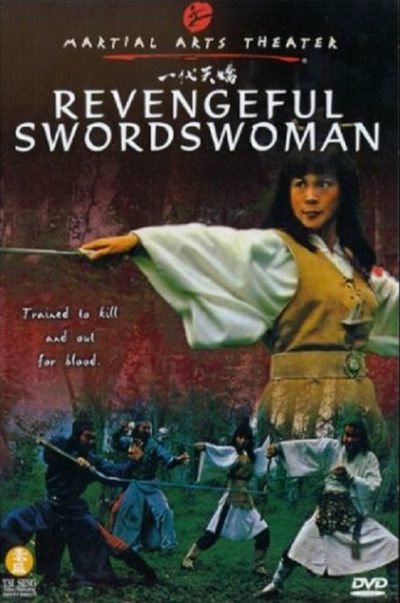 There’s no hanging around here. Virtually as we meet our heroine, Hsiang Ying (Lee), she’s getting tossed off a cliff by her kung-fu teacher, into a pack of wolves. Having survived that and made her way back – perhaps assuming this was all some terrible misunderstanding – her master then disavows her, announces he was the man responsible for killing her father, and locks her up in a cage. This all happens within, literally, three minutes of the film starting. Fortunately, a passing stranger sees fit to free her from the cage, and the ‘Heartless Lady’, as she becomes known, can go on her way, with the eventual aim of being exactly what the title suggests: revengeful.
There’s no hanging around here. Virtually as we meet our heroine, Hsiang Ying (Lee), she’s getting tossed off a cliff by her kung-fu teacher, into a pack of wolves. Having survived that and made her way back – perhaps assuming this was all some terrible misunderstanding – her master then disavows her, announces he was the man responsible for killing her father, and locks her up in a cage. This all happens within, literally, three minutes of the film starting. Fortunately, a passing stranger sees fit to free her from the cage, and the ‘Heartless Lady’, as she becomes known, can go on her way, with the eventual aim of being exactly what the title suggests: revengeful.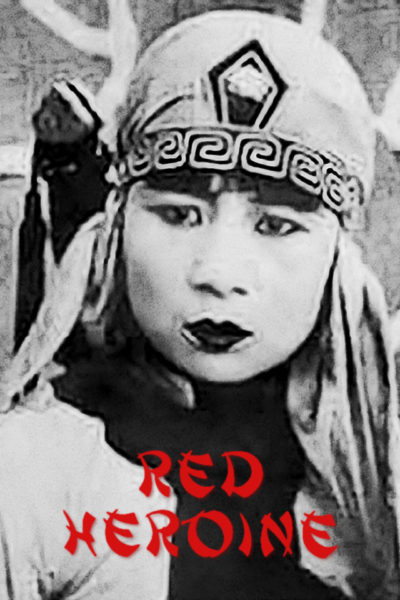 Tied somewhat to our March feature on the earliest action heroines in cinema, is this Chinese film, It’s not just the oldest surviving action heroine film from that country, it’s the oldest martial-arts film of any kind. This silent feature dates from all the way back in 1929 – I had to keep reminding myself that the “red” in the title was not a Communism reference, this being from well before such things. It’s most likely an attempt to cash in on The Burning of the Red Lotus Temple, a now-lost film series whose highly successful release had begun the previous year.
Tied somewhat to our March feature on the earliest action heroines in cinema, is this Chinese film, It’s not just the oldest surviving action heroine film from that country, it’s the oldest martial-arts film of any kind. This silent feature dates from all the way back in 1929 – I had to keep reminding myself that the “red” in the title was not a Communism reference, this being from well before such things. It’s most likely an attempt to cash in on The Burning of the Red Lotus Temple, a now-lost film series whose highly successful release had begun the previous year.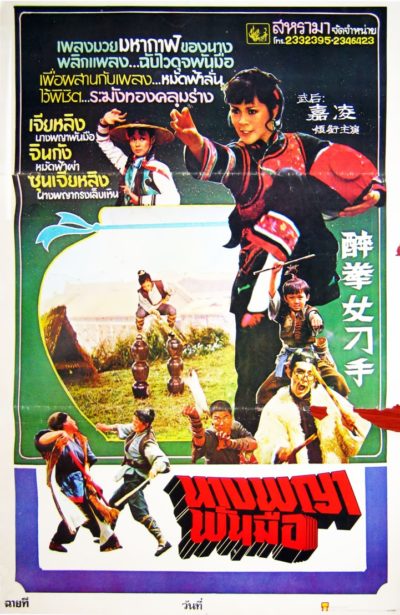 In this late era Judy Lee film, she stars as the confusingly-named Brother Blind, a name which scores only 50% for accuracy. She is indeed, largely unable to see, the result of a confrontation with the motley group of bandits who killed her father (Sit). Though even here, there is some confusion as to whether there are 13 of them, as an alternate title suggest, or 14 as the English dub mentions on several occasions. They’re certainly a random bunch, some of who are missing limbs or fingers, as well as two “giants” who aren’t very tall, and a “poison dwarf” who wields a blow-gun, responsible for Brother Blind losing her sight.
In this late era Judy Lee film, she stars as the confusingly-named Brother Blind, a name which scores only 50% for accuracy. She is indeed, largely unable to see, the result of a confrontation with the motley group of bandits who killed her father (Sit). Though even here, there is some confusion as to whether there are 13 of them, as an alternate title suggest, or 14 as the English dub mentions on several occasions. They’re certainly a random bunch, some of who are missing limbs or fingers, as well as two “giants” who aren’t very tall, and a “poison dwarf” who wields a blow-gun, responsible for Brother Blind losing her sight.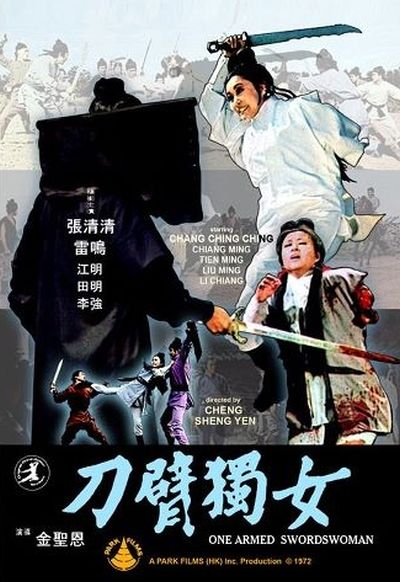 Official disclaimer. I watched two seventies Taiwanese kung-fu flicks the past weekend, this one and Revengeful Swordswoman, and I’m having serious difficulty keeping them separated. You are therefore warned that some plot elements discussed here, may actually have seeped over from Revengeful, or vice-versa…
Official disclaimer. I watched two seventies Taiwanese kung-fu flicks the past weekend, this one and Revengeful Swordswoman, and I’m having serious difficulty keeping them separated. You are therefore warned that some plot elements discussed here, may actually have seeped over from Revengeful, or vice-versa…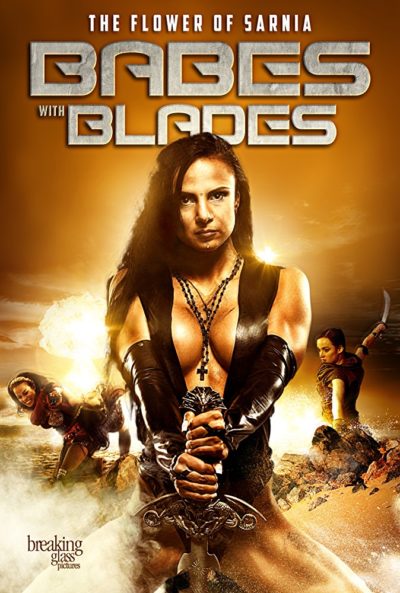 I’m unsure who the woman is on the DVD sleeve. I can only presume it’s Lady Not-Appearing-In-This-Film. For what we have instead seems to be a real labour of love for British stunt-woman Cecily Fay. Though calling her a mere stunt-woman would be selling her short: she also wrote, directed, starred in, edited and scored this feature, plus did the fight choreography and sound re-recording, while sewing every sequin on the costumes herself. Okay, the last might be a bit of a stretch, but since she is also credited as the costume designer… perhaps not. Hell, even Robert Rodriguez doesn’t have such a large collection of hats, and this overwhelming multi-tasking might help explain why it took close to five years between the start of filming and its eventual release. The main problem is that Fay’s talents, while considerable, are not equally spread.
I’m unsure who the woman is on the DVD sleeve. I can only presume it’s Lady Not-Appearing-In-This-Film. For what we have instead seems to be a real labour of love for British stunt-woman Cecily Fay. Though calling her a mere stunt-woman would be selling her short: she also wrote, directed, starred in, edited and scored this feature, plus did the fight choreography and sound re-recording, while sewing every sequin on the costumes herself. Okay, the last might be a bit of a stretch, but since she is also credited as the costume designer… perhaps not. Hell, even Robert Rodriguez doesn’t have such a large collection of hats, and this overwhelming multi-tasking might help explain why it took close to five years between the start of filming and its eventual release. The main problem is that Fay’s talents, while considerable, are not equally spread.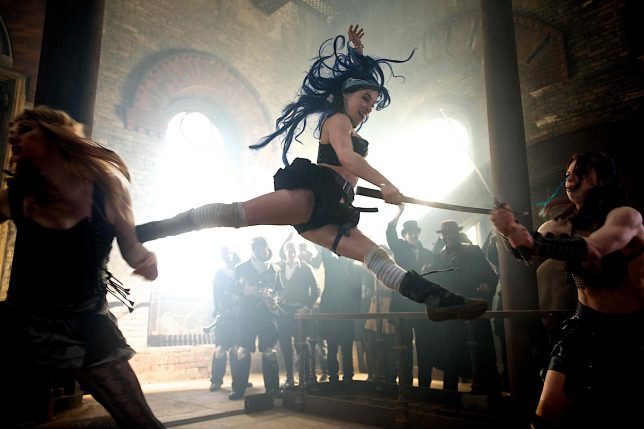 More positively, we have Fay’s acting and directorial talents. The former isn’t much of a surprise, as I enjoyed her performance in
More positively, we have Fay’s acting and directorial talents. The former isn’t much of a surprise, as I enjoyed her performance in 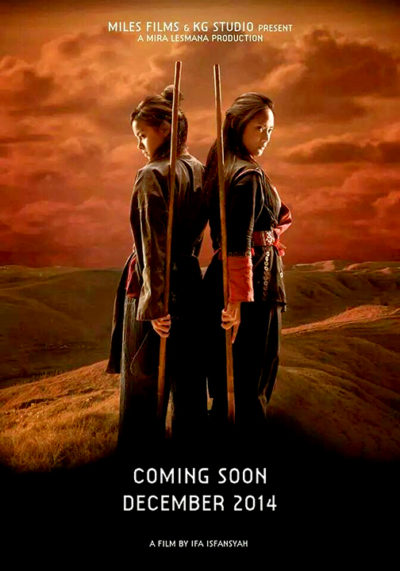 Veteran martial arts guru Cempaka has been training her four students, the children of other gurus she defeated, for years. It’s time to pass on the ultimate move, and the titular artifact which goes with it. She selects Dara (Celia) as her heir, but before Cempaka can bestow the necessary knowledge, she is attacked by Biru (Rahadian) and Gerhana (Basro), two of the students passed over for Dara. In the ensuing fight, Cempaka is killed and the cane stolen by Biru. The injured Dara is found and nursed back to health by the mysterious Elang (Saputra), a man with a murky past and no shortage of his own skills. Biru and Gerhana frame Dara for the death of their mistress, and use the cane’s power to take over the local area. Can Dara track down the last living practitioner of the Golden Cane style, and learn the skills necessary to defeat her fellow students?
Veteran martial arts guru Cempaka has been training her four students, the children of other gurus she defeated, for years. It’s time to pass on the ultimate move, and the titular artifact which goes with it. She selects Dara (Celia) as her heir, but before Cempaka can bestow the necessary knowledge, she is attacked by Biru (Rahadian) and Gerhana (Basro), two of the students passed over for Dara. In the ensuing fight, Cempaka is killed and the cane stolen by Biru. The injured Dara is found and nursed back to health by the mysterious Elang (Saputra), a man with a murky past and no shortage of his own skills. Biru and Gerhana frame Dara for the death of their mistress, and use the cane’s power to take over the local area. Can Dara track down the last living practitioner of the Golden Cane style, and learn the skills necessary to defeat her fellow students?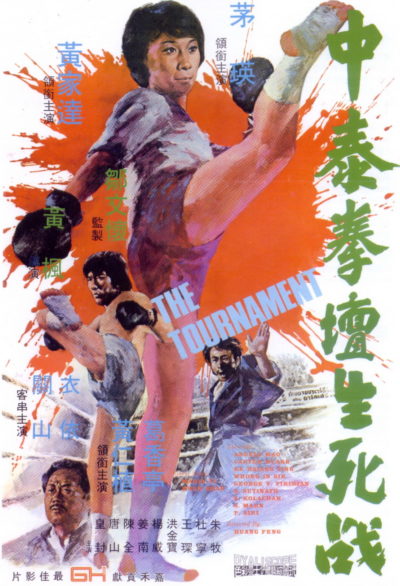 There’s a lot of chit-chat about face, honour and respect here. It begins when the master of a kung-fu school, Lau, has his daughter kidnapped by local hoodlums, after he won’t cough up protection money. Perhaps surprisingly, rather than using his skills to kick their arses, he sends two students to Thailand, including his son, Hong (Wong) in an effort to win the necessary funds. Hong loses, the other student is killed, and Lau is drummed out of the local Kung-Fu Association for having disgraced the name of Chinese martial arts by losing to foreigners. He’s so devastated, he hangs himself, leaving it up to his daughter, Siu Fung (Mao) to restore the family name, learn how to mesh Chinese kung-fu with Thai boxing, and rescue her sister. Quite the “to-do” list, I’d say.
There’s a lot of chit-chat about face, honour and respect here. It begins when the master of a kung-fu school, Lau, has his daughter kidnapped by local hoodlums, after he won’t cough up protection money. Perhaps surprisingly, rather than using his skills to kick their arses, he sends two students to Thailand, including his son, Hong (Wong) in an effort to win the necessary funds. Hong loses, the other student is killed, and Lau is drummed out of the local Kung-Fu Association for having disgraced the name of Chinese martial arts by losing to foreigners. He’s so devastated, he hangs himself, leaving it up to his daughter, Siu Fung (Mao) to restore the family name, learn how to mesh Chinese kung-fu with Thai boxing, and rescue her sister. Quite the “to-do” list, I’d say. It is pretty close to an article of faith that no movie starring Yukari Oshima and Cynthia Khan can ever be entirely worthless. This film, however, shakes that belief to its very foundation. Not least because despite the cover and credits, found just about everywhere (including here), it barely stars them – indeed, Khan doesn’t even show up for the finale, with absolutely no explanation provided. This is included here, mostly as a warning, and because I’m a stickler for completeness with regard to their filmographies. Though in this case, I suspect, I’m less a stickler and more the sucker.
It is pretty close to an article of faith that no movie starring Yukari Oshima and Cynthia Khan can ever be entirely worthless. This film, however, shakes that belief to its very foundation. Not least because despite the cover and credits, found just about everywhere (including here), it barely stars them – indeed, Khan doesn’t even show up for the finale, with absolutely no explanation provided. This is included here, mostly as a warning, and because I’m a stickler for completeness with regard to their filmographies. Though in this case, I suspect, I’m less a stickler and more the sucker.